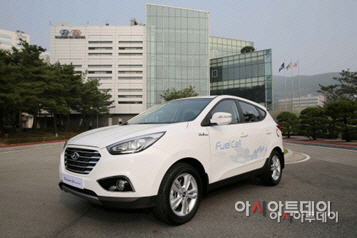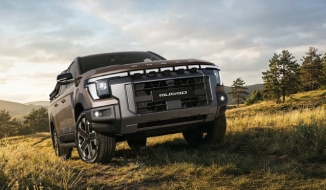|
A hydrogen fuel-cell vehicle refers to a car that runs with water and hydrogen. Hydrogen cars are regarded as the most eco-friendly future cars at the moment because they don‘t need fossil fuel and emit only water vapor as exhaust.
For this reason, Hyudai Motor and other global carmakers are focusing on mass production of hydrogen vehicles. Hydrogen vehicles have shorter charging time (5 minutes or less) than electric cars’ but they can go much longer on a single charge.
Set to be released this year, Hyundai Motor‘s Tucson ix can reach a top speed of 160 kilometers per hour and can also go from zero to 100 kilometers per hour in 12.5 seconds, which is similar to ordinary cars. It can travel 415 kilometers on a single charge. It can even start in temperatures as low as 20 degrees below zero.
However, there are drawbacks to the hydrogen vehicles.
The price is very expensive. The price of the Tucson hydrogen car has been set at 150 million won. Hyundai Motor forecasted consumers will be able to purchase by 2010 based on technology development and mass production of parts at price level of 10% higher than diesel cars.
Hyundai Motor sees year 2020 as the era of hydrogen car popularization because the company expects that prices will come down to affordable by then due to mass production of main parts and other reasons.
Over 95 percent of all parts that go into Hyundai Motor’s hydrogen cars are made in the country through collaboration with 200 local partners. This figure is higher than German or U.S. carmakers.
Another drawback is that there is a risk associated with the hydrogen leakage.
Ahn Byung-ki, director of the carmaker‘s fuel cell team, said, “Since Tucson is world’s first mass-produced hydrogen car, we blocked out hydrogen leakage through continuous safety tests including front, rear and side collision tests and rollover test. It received 27 safety certificates and ensured world‘s highest level of safety.”
Hyundai Motor already began selling hydrogen cars in Europe and is expected to sell a total of 40 Tucson hydrogen cars to local governments including Seoul and Ulsan City starting with 15 cars to Gwangju city this year. It plans to sell more than 10,000 hydrogen fuel cell vehicles in Korea by 2025.
Kwak Jin, vice president of the Sales Promotion Division at Hyundai Motor, said, “It’s true that Hyundai‘s history of eco-friendly cars is shorter than other carmakers. We are sure we will take the lead in the future eco-friendly car market since we are putting much more investment and efforts in technology development than other carmakers.”
Meanwhile, Hyundai Motor, recognizing the importance of infrastructure building, plans to build two more hydrogen fueling stations within the year to augment 11 already in operation as of April 2014.
The company also plans to build workshops exclusively for hydrogen cars for car maintenance and A/S in major cities within the year and plans to expand to 23 centers and 100 maintenance shops across the nation by 2025.




















